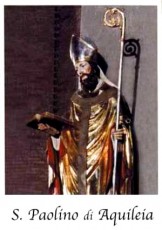Catholic Blesseds, Saints, Solemnities & Holy Days

Saint Paulinus of Aquileia
Feast Day: January 11
St. Paulinus was born at Premariacco, Italy, to a Roman family during the later days of Lombard rule. He received his education in the patriarchal school at Cividale. After his ordination to the Priesthood, he became master of the same school. There he acquired a thorough Latin culture, both in pagan and Christian classics. He also acquired a relatively deep knowledge of jurisprudence, and an extensive Scriptural, Theological, and Patristic training.
His educational background prepared him to play a key part in the Carolingian Renaissance, allowing him to assist in the promotion of Christendom and the restoration of Western Civilization, after centuries of unstable barbarian rule. It was due to his exceptional learning that Paulinus first came to the attention of Charlemagne in 774. Because of his loyalty to Charlemagne during the rebellion in 776, he was rewarded with many favors, among them the gift of property. In that same year, he was appointed as “Master of Grammar” for Charlemagne. While at the Palace School, he would meet many of the leading scholars of the age. He remained there for 10 years.
In 787, he was appointed as the Patriarch of Aquileia. St. Paulinus returned to his Episcopal See and took up residence at Cividale. As Patriarch, Paulinus was able to take a more active and prominent part in implementing societal reforms. He exhibited prudence and pastoral zeal. He obtained the right for free election of future patriarchs of the Cathedral chapter of Aquileia, and other privileges for his work, as well as for the Monastery of St. Mary in Organo, many Churches and hospitals. He died on January 11, 804. After several translations of his relics, the Patriarch was laid to rest under the Altar of the crypt of the Basilica of Cividale del Friuli.





